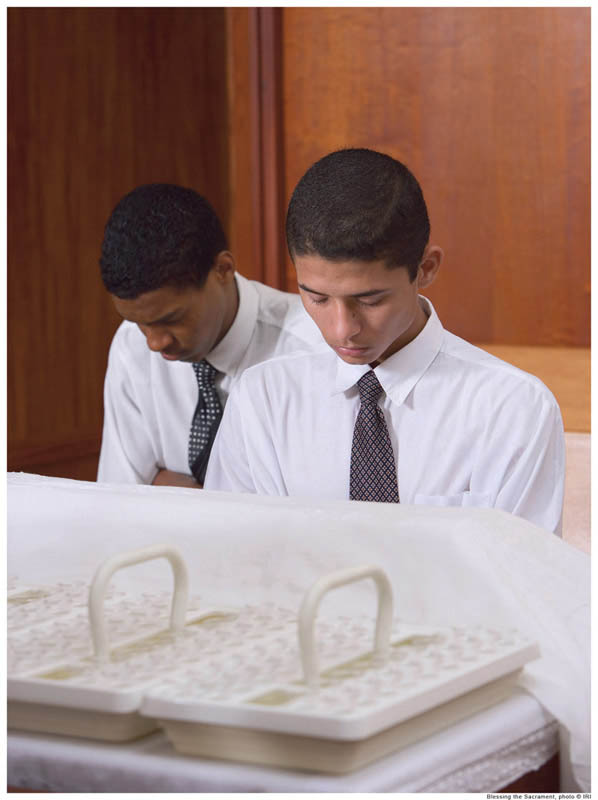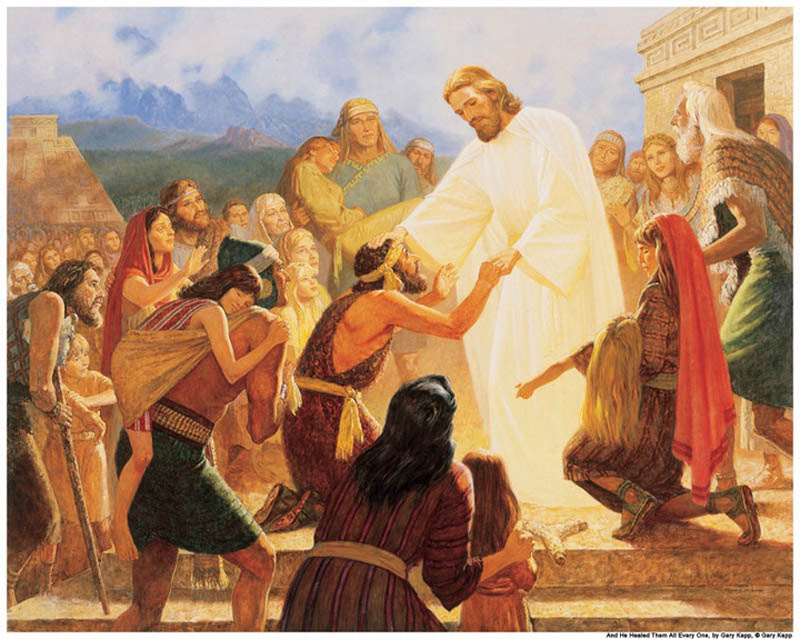The Book of Mormon, used by Mormons as a companion to the Bible, distinguishes between true priesthood and “priestcraft.” Priestcraft is a form of false priesthood and can be very dangerous. Of course, the practice of priestcraft isn’t just limited to those holding the priesthood. Anyone who is supposed to be serving God can find himself falling prey to aspects of this dangerous practice.
 In the Book of Mormon, an ancient prophet named Nephi defined priestcraft:
In the Book of Mormon, an ancient prophet named Nephi defined priestcraft:
“He commandeth that there shall be no priestcrafts; for, behold, priestcrafts are that men preach and set themselves up for a light unto the world, that they may get gain and praise of the world; but they seek not the welfare of Zion” (2 Nephi 26:29).
We know, of course, that Jesus Christ is the light of the world, but some ministers and teachers of religion seem to put the focus on themselves when they teach, acting out of pride, rather than humility. They become very famous, and a lot of glitz and glamour accompanies their preaching. They become celebrities, living a rock star sort of life. While sometimes fame is inevitable, whether or not it is priestcraft depends on the way the ministry is carried out—the motive behind the actions. When the speaker spends more time talking about himself and how wonderful he is than about God and God’s plan, that can be priestcraft. If he prepares his sermons with the primary goal of entertaining, demonstrating his own talents as a speaker, or giving people what they want instead of what God wants them to have, that can be priestcraft as well.
Priesthood Without a Paycheck
Let’s look at an example in the Book of Mormon. Church leaders in the Book of Mormon took pride in the fact that they did not accept paychecks for their church work. They had regular employment and did their church work as volunteers. (Mormons today also have a lay leadership.) They did not consider themselves more important than those who were not church leaders.
And when the priests left their labor to impart the word of God unto the people, the people also left their labors to hear the word of God. And when the priest had imparted unto them the word of God they all returned again diligently unto their labors; and the priest, not esteeming himself above his hearers, for the preacher was no better than the hearer, neither was the teacher any better than the learner; and thus they were all equal, and they did all labor, every man according to his strength.
And they did impart of their substance, every man according to that which he had, to the poor, and the needy, and the sick, and the afflicted; and they did not wear costly apparel, yet they were neat and comely (Alma 1:26-27).
Unfortunately, a man named Nehor had other ideas about how the priesthood should operate, and he went to work trying to convince people he was right. In the same chapter quoted above, we learn that he set himself up as a priest and began preaching his version of the gospel to the people. He taught that priests and teachers should be paid by their audiences and shouldn’t have to have other jobs or sources of income. He taught that in order to be able to support themselves through their teachings, they needed to become popular.
When Popularity is More Important Than God–Priestcraft
Nehor demonstrated what he meant by setting out to become popular himself. How did he do that? Well, if you want lots of followers who will make you rich, you have to tell them what they want to hear—which isn’t always what God wants you to tell them. What God asks is often hard, and people frequently don’t want to hear it. So, Nehor taught that it was not important to live morally, keep commandments, or make any kinds of worldly sacrifices at all because God was going to save everyone in the end. This was the sort of thing people like to hear. (Today, this is sometimes referred to as cheap salvation or easy salvation.) This meant they could call themselves Christians, but sin was all they really wanted. There was no need to care for the poor, treat others kindly, have self-discipline, or put God first. He developed lots of followers by telling them what they wanted to hear, and they were happy to give him money, so he would keep right on lying to them. He started a church and began to dress in expensive clothing. He was very prideful—his success was all about him, not God.
The problem, of course, was that his preaching was also all about him, not God. He was lying to his followers. Anyone who has spent any time with the scriptures knows God is very clear that our actions matter. They don’t save us, but they demonstrate our commitment to God and Jesus Christ and our love for them. Making these people think they could be saved no matter how wicked they chose to be was cruel, because it was a lie. He was lying in order to win followers, gain celebrity status, and earn money. When Gideon, a teacher in the true church, confronted him about his deception, he tried to kill Gideon with his sword.
Why was Nehor’s behavior, which was priestcraft at its worst, so dangerous? Because he wanted fame and fortune, he found it more useful to preach popular ideas, rather than truth. Truth wasn’t fun or popular. He taught only what people wanted to hear and to pay for. It led to temptations that caused him to represent Satan, not God.
Most of us aren’t going on to fame and fortune, but we can find ourselves in situations that can lead us to practice priestcraft—even when no money is involved at all. It all comes down to our intent.
We Can All Be Tempted to Put Ourselves Before God
Here is a very simple example from my own life. I love to tell stories and I’m generally considered a pretty good teacher of children. When I used to tell stories in my classes in my earlier days as a children’s religion teacher, I would jazz them up a little. The lessons in the manual were sometimes boring. A little added sparkle was okay, but sometimes I was more interested in telling a great story and entertaining the children than I was in teaching the moral message.
One day I told a dull story about a girl who sneaked out of bed and played all night. The next day she was tired and cranky at home and at church. She learned to obey her parents in order to have a good day. I modeled my own telling after a popular children’s book and made it entertaining and funny. I built up in detail the misdeed and the results and then skipped hurriedly through the lesson learned, since that wasn’t much fun. The following week, a child told me she had done just what I taught in the story. I was pleased and said, “You obeyed your parents so you’d have a good day?”
“No, I sneaked out of bed and played late at night.”
 I caught my breath and felt ashamed. My desire to show off my storytelling skills had led a child to think I wanted her to misbehave. This was the essence of priestcraft—I had taught for my own ego, and not for God. I apologized to the children (and later to the girl’s parents) and explained what I had done wrong and what the story was supposed to teach.
I caught my breath and felt ashamed. My desire to show off my storytelling skills had led a child to think I wanted her to misbehave. This was the essence of priestcraft—I had taught for my own ego, and not for God. I apologized to the children (and later to the girl’s parents) and explained what I had done wrong and what the story was supposed to teach.
The children asked me to tell that story again. I did, but this time I told it simply and quietly, minimizing the misbehavior and amplifying the change of heart that led the child to learn to obey. Surprisingly, they liked this version just as much and often asked for it again.
While most of us won’t start churches for popular gain, we can easily find ourselves distracted from the ultimate goal of our religious work—to lead souls to Christ. If we lose sight of that goal, we are in danger of becoming a lot like Nehor and of letting God and those we teach down. True Christianity comes when God is the sole motivator for our actions.
Are you an active, practicing Latter-day Saints who loves writing about the scriptures? LDSBlogs.com is looking for a volunteer to write a weekly article like this one on the Mormon scriptures for non-members. See our Volunteer page for more information and other topics that are looking for writers.
About Terrie Lynn Bittner
The late Terrie Lynn Bittner—beloved wife, mother, grandmother, and friend—was the author of two homeschooling books and numerous articles, including several that appeared in Latter-day Saint magazines. She became a member of the Church at the age of 17 and began sharing her faith online in 1992.





